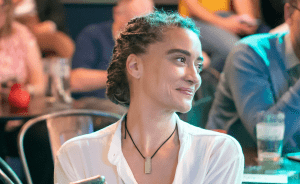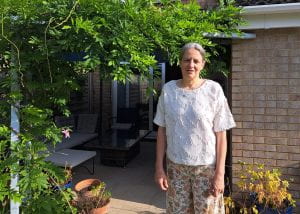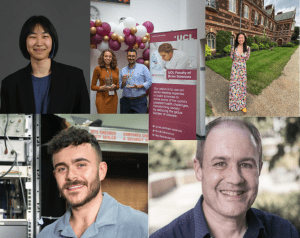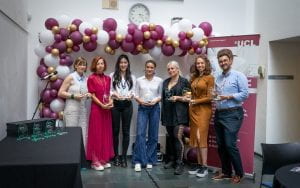Winners and Runners-Up: Brain Sciences EDI Awards & Celebration 2025
By b.isibor, on 30 June 2025
These awards celebrate staff leading the way in equality, diversity and inclusion across the Faculty. From inclusive research and education to fairer funding and career development, this year’s winners and nominees have made a lasting impact on creating a more equitable academic environment. Congratulations to all! Winners were announced at the awards ceremony on June 4th as followed:
Dean’s Excellence in EDI Innovation Award
Joint-winner: Katerina Fotopoulou and The Co-Production Project Team- have redesigned the ERB Centre’s small grant process. Their collaboration with community partners has led to the implementation of inclusive criteria, bias checks, and a partial lottery system to ensure fairness and equity. 
Joint-winner: Rashmi Mathew and Christin Henein, Institute of Ophthalmology – are recognized for their initiatives, EyeBelong and EyeInclude, which promote inclusion in postgraduate education, enhancing student belonging and teaching culture.
The Contribution to EDI in Education and Student Experience Award

Winner: Professor Jon Roiser, Division of Psychology and Language Sciences (PaLS) – for exceptional leadership of the UCL-Wellcome 4-year PhD in Mental Health Science. His work includes ring-fenced studentships for racially minoritised applicants, blinded shortlisting to reduce bias, and the integration of lived experience through co-production training and advisory roles—setting a new standard for inclusive postgraduate education.
Runners Up: Ally Tomlins, Division of Psychology and Language Sciences (PaLS) – for the “Living Library” initiative, which centres lived experience in mental health education. Ally created a space where students engage directly with experts by experience, individuals with personal histories of mental health challenges, promoting empathy, reflection, and inclusive learning.
Contribution to EDI in Research Award
Winner: Professor Karoline Kuchenbaecker, Division of Psychiatry – for pioneering research in genomics that has transformed understanding of genetic findings across ancestries. Their work has laid the foundation for equitable precision medicine and exposed ancestry biases in NHS genomic care. As Scientific Lead for Diverse Data in a national programme, Karoline leads initiatives tackling health disparities, including major studies on Sickle Cell Disease and maternal health.
Runner-up: Fahima Kathun, UCL Ear Institute – for outstanding leadership of the NIHR UCLH BRC Hearing Health Theme PPIE Panel. Fahima has embedded EDI principles into hearing health research by engaging individuals with lived experience of hearing loss from diverse backgrounds. Their co-produced work has influenced national collaborations and ensured underrepresented voices shape research design, public engagement, and governance.
Contribution to EDI in Practice Award
Winner: Dr Conceição Bettencourt, Institute of Neurology- They have shown

outstanding leadership at the Institute of Neurology by leading career development initiatives that address systemic barriers for all staff, especially technical staff and professional services, and underrepresented groups. Key efforts include workshops on promotions, networking events, and career development support, all driven by data and collaboration.
Runner-up: Jane Hahn, Nafiso Ahmed, Ilaria Costantini, and Rawleka Wilson, Division of Psychiatry- for their Mental Health Careers Workshop, which supported students from diverse backgrounds in exploring mental health careers.
 Close
Close










 Professor Courtenay Norbury, the Vice Dean for Research, then recognised the work of researchers across the Faculty and specifically praised the establishment of the Centre for Equality Research in Brain Sciences. Courtenay then presented the award category ‘Contribution to EDI in Research.’ The winner of this category was Audrey Zhang for conducting a research project that explored the ‘Effects of Personal and Contextual Factors on Status and Belongingness of First-year Undergraduate Students.’
Professor Courtenay Norbury, the Vice Dean for Research, then recognised the work of researchers across the Faculty and specifically praised the establishment of the Centre for Equality Research in Brain Sciences. Courtenay then presented the award category ‘Contribution to EDI in Research.’ The winner of this category was Audrey Zhang for conducting a research project that explored the ‘Effects of Personal and Contextual Factors on Status and Belongingness of First-year Undergraduate Students.’



 Musambo Kapapa is an ICGNMD PhD Fellow and a highly qualified physiotherapist at University Teaching Hospital (UTH), Lusaka. Ms Kapapa has broad interests across NMDs and physiotherapy. Her PhD is titled: The development of an evidence-based genetic neuromuscular diseases management protocol for physiotherapists focused on physiotherapy practices, patients, and family experiences in Zambia. Her project will focus on developing physiotherapy clinical practice and clinical trial readiness for functional assessment for people living with genetic neuromuscular diseases in Zambia, and she will be supervised by Dr. Gita Ramdharry from the Institute of Neurology.
Musambo Kapapa is an ICGNMD PhD Fellow and a highly qualified physiotherapist at University Teaching Hospital (UTH), Lusaka. Ms Kapapa has broad interests across NMDs and physiotherapy. Her PhD is titled: The development of an evidence-based genetic neuromuscular diseases management protocol for physiotherapists focused on physiotherapy practices, patients, and family experiences in Zambia. Her project will focus on developing physiotherapy clinical practice and clinical trial readiness for functional assessment for people living with genetic neuromuscular diseases in Zambia, and she will be supervised by Dr. Gita Ramdharry from the Institute of Neurology. Mafalda Mascarenhas is a PhD candidate in LiSP – Lisbon Doctoral Program in Social Psychology with a studentship from the Portuguese Foundation of Science and Technology (FCT). Her research aims to understand the sociopsychological factors that influence teachers’ recommendations for professional education (vs. scientific-humanistic high-school diplomas) for Black students, namely the role that behavior in the classroom and achievement have on those recommendations. Her project will focus on the impact of teachers’ perceptions of students’ agency on school paths, and she will be supervised by Prof. Lasana Harris from the Division of Psychology and Language Sciences.
Mafalda Mascarenhas is a PhD candidate in LiSP – Lisbon Doctoral Program in Social Psychology with a studentship from the Portuguese Foundation of Science and Technology (FCT). Her research aims to understand the sociopsychological factors that influence teachers’ recommendations for professional education (vs. scientific-humanistic high-school diplomas) for Black students, namely the role that behavior in the classroom and achievement have on those recommendations. Her project will focus on the impact of teachers’ perceptions of students’ agency on school paths, and she will be supervised by Prof. Lasana Harris from the Division of Psychology and Language Sciences.